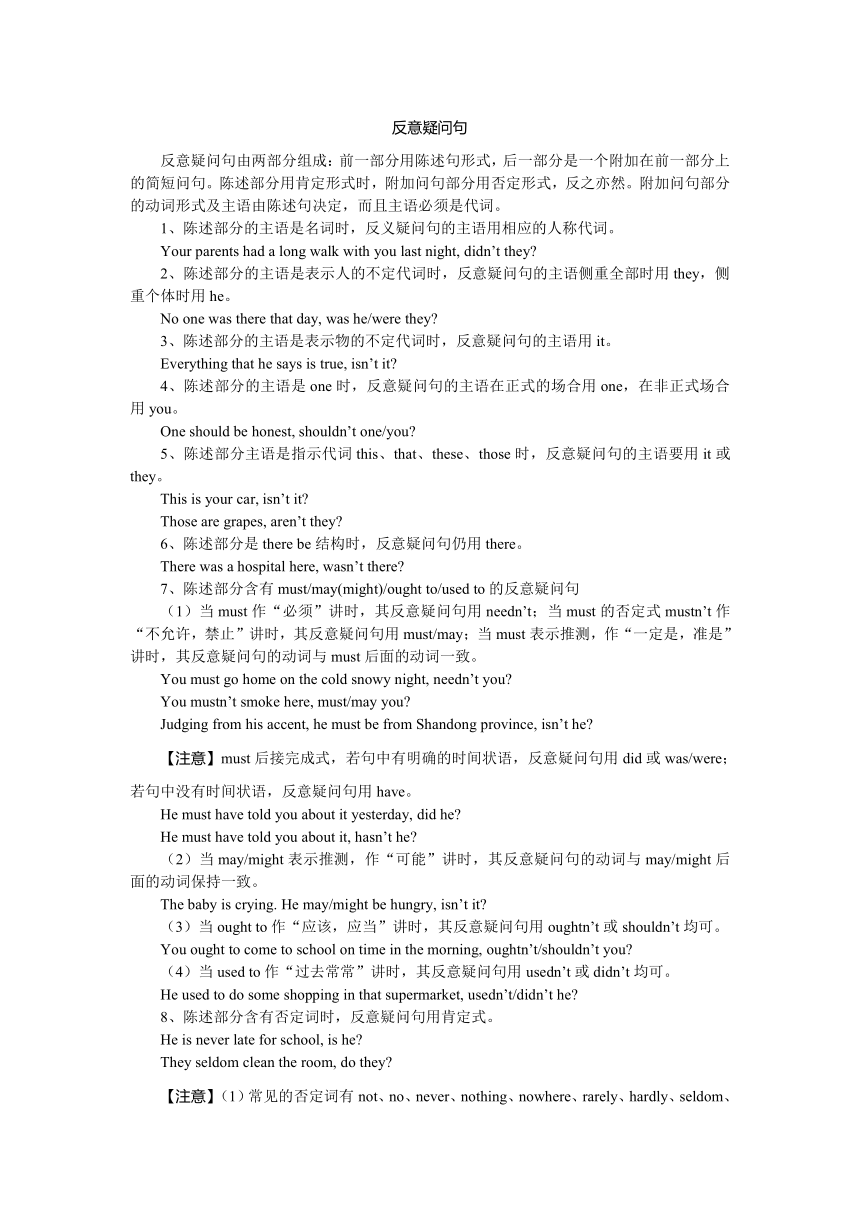高中·反意疑问句
图片预览

文档简介
反意疑问句
反意疑问句由两部分组成:前一部分用陈述句形式,后一部分是一个附加在前一部分上的简短问句。陈述部分用肯定形式时,附加问句部分用否定形式,反之亦然。附加问句部分的动词形式及主语由陈述句决定,而且主语必须是代词。
1、陈述部分的主语是名词时,反义疑问句的主语用相应的人称代词。
Your
parents
had
a
long
walk
with
you
last
night,
didn’t
they
2、陈述部分的主语是表示人的不定代词时,反意疑问句的主语侧重全部时用they,侧重个体时用he。
No
one
was
there
that
day,
was
he/were
they
3、陈述部分的主语是表示物的不定代词时,反意疑问句的主语用it。
Everything
that
he
says
is
true,
isn’t
it
4、陈述部分的主语是one时,反意疑问句的主语在正式的场合用one,在非正式场合用you。
One
should
be
honest,
shouldn’t
one/you
5、陈述部分主语是指示代词this、that、these、those时,反意疑问句的主语要用it或they。
This
is
your
car,
isn’t
it
Those
are
grapes,
aren’t
they
6、陈述部分是there
be结构时,反意疑问句仍用there。
There
was
a
hospital
here,
wasn’t
there
7、陈述部分含有must/may(might)/ought
to/used
to的反意疑问句
(1)当must作“必须”讲时,其反意疑问句用needn’t;当must的否定式mustn’t作“不允许,禁止”讲时,其反意疑问句用must/may;当must表示推测,作“一定是,准是”讲时,其反意疑问句的动词与must后面的动词一致。
You
must
go
home
on
the
cold
snowy
night,
needn’t
you
You
mustn’t
smoke
here,
must/may
you
Judging
from
his
accent,
he
must
be
from
Shandong
province,
isn’t
he
【注意】must后接完成式,若句中有明确的时间状语,反意疑问句用did或was/were;若句中没有时间状语,反意疑问句用have。
He
must
have
told
you
about
it
yesterday,
did
he
He
must
have
told
you
about
it,
hasn’t
he
(2)当may/might表示推测,作“可能”讲时,其反意疑问句的动词与may/might后面的动词保持一致。
The
baby
is
crying.
He
may/might
be
hungry,
isn’t
it
(3)当ought
to作“应该,应当”讲时,其反意疑问句用oughtn’t或shouldn’t均可。
You
ought
to
come
to
school
on
time
in
the
morning,
oughtn’t/shouldn’t
you
(4)当used
to作“过去常常”讲时,其反意疑问句用usedn’t或didn’t均可。
He
used
to
do
some
shopping
in
that
supermarket,
usedn’t/didn’t
he
8、陈述部分含有否定词时,反意疑问句用肯定式。
He
is
never
late
for
school,
is
he
They
seldom
clean
the
room,
do
they
【注意】(1)常见的否定词有not、no、never、nothing、nowhere、rarely、hardly、seldom、few、little等;
(2)若陈述部分有带否定意义词缀的派生词,如dislike、useless、unfair等时,仍看作为肯定形式,后面的反意疑问句仍用否定式。
9、陈述部分是祈使句时,反意疑问句用will
you或won’t
you。
Look
at
the
blackboard,
will/won’t
you
Don’t
make
any
noise,
will
you
【注意】
(1)以Let’s开头的祈使句,反意疑问句用shall
we;
(2)以Let
us/me开头的祈使句,反意疑问句用will
you;
(3)陈述部分是否定式的祈使句,反意疑问句用will
you或can
you都可以。
10、陈述部分是并列句时,反意疑问句与邻近的分句一致。
She
works
hard
and
she
is
the
best
one
in
her
factory,
isn’t
she
11、陈述部分是复合句时,反意疑问句与主句一致。
When
the
teacher
speaks
in
class,
we
have
to
keep
quiet,
don’t
we
12、陈述部分是否定转移句式时,反意疑问句与从句一致,且用肯定形式。此时,主句主语是第一人称,主句的谓语通常是think、believe、suppose、expect、consider、imagine、guess等。但是,若主句主语不是第一人称I/we时,反意疑问句部分仍与主句的主语一致。
I
don’t
think
he
will
come,
will
he
He
doesn’t
believe
that
they
have
arrived,
does
he
【注意】在回答反意疑问句时,不管其陈述部分是肯定的还是否定的,如果事实是肯定的,回答用“Yes+肯定的简略句”;如果事实是否定的,回答用“No+否定的简略句”,形式要一致。陈述部分是否定形式时,答语中的yes翻译成“不”,no翻译成“是”。
—They
haven’t
been
told
the
truth,
have
they
他们还没有被告知事情的真相,是吗?
—Yes,
they
have.
/No,
they
haven’t.
不,已经告诉了。/是的,还没有。
【巩固训练】
1.
There
is
little
doubt
in
your
mind
that
he
is
innocent,
________
A.
is
there
B.
isn’t
there
C.
is
he
D.
isn’t
he
2.
—I
spent
two
weeks
in
London
last
summer.
—Then
you
must
have
visited
the
British
Museum
during
your
stay,
________
you
A.
mustn’t
B.
haven’t
C.
didn’t
D.
hadn’t
3.
—Guess
what
he
is
doing
now
—He
must
be
helping
his
old
mum
to
water
the
flowers,
________
A.
mustn’t
he
B.
must
he
C.
is
he
D.
isn’t
he
4.
I
don’t
think
David
could
have
done
such
a
stupid
thing
last
night,
________
A.
did
he
B.
didn’t
he
C.
do
I
D.
don’t
I
5.
I
know
you
are
a
person
of
great
determination,
but
let
us
donate
some
money
to
you
this
time,
________
A.
don’t
you
B.
don’t
we
C.
will
you
D.
shall
we
6.
The
mother
of
the
boy
told
us
that
there
was
no
money
in
his
schoolbag
at
that
time,
________
A.
was
there
B.
wasn’t
there
C.
didn’t
she
D.
did
she
7.
There
must
have
been
a
large
number
of
tourists
in
Sanya
during
the
past
Spring
Festival,
________
A.
mustn’t
there
B.
hadn’t
there
C.
wasn’t
there
D.
didn’t
there
8.
I
told
them
not
everybody
could
run
as
fast
as
you
did,
________
A.
could
he
B.
didn’t
I
C.
didn’t
you
D.
could
they
反意疑问句由两部分组成:前一部分用陈述句形式,后一部分是一个附加在前一部分上的简短问句。陈述部分用肯定形式时,附加问句部分用否定形式,反之亦然。附加问句部分的动词形式及主语由陈述句决定,而且主语必须是代词。
1、陈述部分的主语是名词时,反义疑问句的主语用相应的人称代词。
Your
parents
had
a
long
walk
with
you
last
night,
didn’t
they
2、陈述部分的主语是表示人的不定代词时,反意疑问句的主语侧重全部时用they,侧重个体时用he。
No
one
was
there
that
day,
was
he/were
they
3、陈述部分的主语是表示物的不定代词时,反意疑问句的主语用it。
Everything
that
he
says
is
true,
isn’t
it
4、陈述部分的主语是one时,反意疑问句的主语在正式的场合用one,在非正式场合用you。
One
should
be
honest,
shouldn’t
one/you
5、陈述部分主语是指示代词this、that、these、those时,反意疑问句的主语要用it或they。
This
is
your
car,
isn’t
it
Those
are
grapes,
aren’t
they
6、陈述部分是there
be结构时,反意疑问句仍用there。
There
was
a
hospital
here,
wasn’t
there
7、陈述部分含有must/may(might)/ought
to/used
to的反意疑问句
(1)当must作“必须”讲时,其反意疑问句用needn’t;当must的否定式mustn’t作“不允许,禁止”讲时,其反意疑问句用must/may;当must表示推测,作“一定是,准是”讲时,其反意疑问句的动词与must后面的动词一致。
You
must
go
home
on
the
cold
snowy
night,
needn’t
you
You
mustn’t
smoke
here,
must/may
you
Judging
from
his
accent,
he
must
be
from
Shandong
province,
isn’t
he
【注意】must后接完成式,若句中有明确的时间状语,反意疑问句用did或was/were;若句中没有时间状语,反意疑问句用have。
He
must
have
told
you
about
it
yesterday,
did
he
He
must
have
told
you
about
it,
hasn’t
he
(2)当may/might表示推测,作“可能”讲时,其反意疑问句的动词与may/might后面的动词保持一致。
The
baby
is
crying.
He
may/might
be
hungry,
isn’t
it
(3)当ought
to作“应该,应当”讲时,其反意疑问句用oughtn’t或shouldn’t均可。
You
ought
to
come
to
school
on
time
in
the
morning,
oughtn’t/shouldn’t
you
(4)当used
to作“过去常常”讲时,其反意疑问句用usedn’t或didn’t均可。
He
used
to
do
some
shopping
in
that
supermarket,
usedn’t/didn’t
he
8、陈述部分含有否定词时,反意疑问句用肯定式。
He
is
never
late
for
school,
is
he
They
seldom
clean
the
room,
do
they
【注意】(1)常见的否定词有not、no、never、nothing、nowhere、rarely、hardly、seldom、few、little等;
(2)若陈述部分有带否定意义词缀的派生词,如dislike、useless、unfair等时,仍看作为肯定形式,后面的反意疑问句仍用否定式。
9、陈述部分是祈使句时,反意疑问句用will
you或won’t
you。
Look
at
the
blackboard,
will/won’t
you
Don’t
make
any
noise,
will
you
【注意】
(1)以Let’s开头的祈使句,反意疑问句用shall
we;
(2)以Let
us/me开头的祈使句,反意疑问句用will
you;
(3)陈述部分是否定式的祈使句,反意疑问句用will
you或can
you都可以。
10、陈述部分是并列句时,反意疑问句与邻近的分句一致。
She
works
hard
and
she
is
the
best
one
in
her
factory,
isn’t
she
11、陈述部分是复合句时,反意疑问句与主句一致。
When
the
teacher
speaks
in
class,
we
have
to
keep
quiet,
don’t
we
12、陈述部分是否定转移句式时,反意疑问句与从句一致,且用肯定形式。此时,主句主语是第一人称,主句的谓语通常是think、believe、suppose、expect、consider、imagine、guess等。但是,若主句主语不是第一人称I/we时,反意疑问句部分仍与主句的主语一致。
I
don’t
think
he
will
come,
will
he
He
doesn’t
believe
that
they
have
arrived,
does
he
【注意】在回答反意疑问句时,不管其陈述部分是肯定的还是否定的,如果事实是肯定的,回答用“Yes+肯定的简略句”;如果事实是否定的,回答用“No+否定的简略句”,形式要一致。陈述部分是否定形式时,答语中的yes翻译成“不”,no翻译成“是”。
—They
haven’t
been
told
the
truth,
have
they
他们还没有被告知事情的真相,是吗?
—Yes,
they
have.
/No,
they
haven’t.
不,已经告诉了。/是的,还没有。
【巩固训练】
1.
There
is
little
doubt
in
your
mind
that
he
is
innocent,
________
A.
is
there
B.
isn’t
there
C.
is
he
D.
isn’t
he
2.
—I
spent
two
weeks
in
London
last
summer.
—Then
you
must
have
visited
the
British
Museum
during
your
stay,
________
you
A.
mustn’t
B.
haven’t
C.
didn’t
D.
hadn’t
3.
—Guess
what
he
is
doing
now
—He
must
be
helping
his
old
mum
to
water
the
flowers,
________
A.
mustn’t
he
B.
must
he
C.
is
he
D.
isn’t
he
4.
I
don’t
think
David
could
have
done
such
a
stupid
thing
last
night,
________
A.
did
he
B.
didn’t
he
C.
do
I
D.
don’t
I
5.
I
know
you
are
a
person
of
great
determination,
but
let
us
donate
some
money
to
you
this
time,
________
A.
don’t
you
B.
don’t
we
C.
will
you
D.
shall
we
6.
The
mother
of
the
boy
told
us
that
there
was
no
money
in
his
schoolbag
at
that
time,
________
A.
was
there
B.
wasn’t
there
C.
didn’t
she
D.
did
she
7.
There
must
have
been
a
large
number
of
tourists
in
Sanya
during
the
past
Spring
Festival,
________
A.
mustn’t
there
B.
hadn’t
there
C.
wasn’t
there
D.
didn’t
there
8.
I
told
them
not
everybody
could
run
as
fast
as
you
did,
________
A.
could
he
B.
didn’t
I
C.
didn’t
you
D.
could
they
